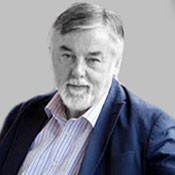Imagine Economics as an Evolutionary Science
What might an evolutionary perspective mean for the future of economics?

By Geoffrey Hodgson

GEOFFREY HODGSON
Geoffrey M. Hodgson is research professor at Hertfordshire Business School, University of Hertfordshire, England. He is the author of Conceptualizing Capitalism and author or co-author of over a dozen other books. Twitter: @g_m_hodgson
In 1898, the great American institutional economist Thorstein Veblen published an article entitled: “Why is economics not an evolutionary science?” By “evolutionary”, Veblen explained that he meant an economics that took full account of the impact of Darwinism on the social and behavioral sciences.
More than a century has passed, and since 1898 there has been a notable increase in the use of evolutionary ideas in economics. Important examples include the large literature inspired by Richard Nelson and Sidney Winter’s path-breaking 1982 book on An Evolutionary Theory of Economic Change and the vibrant development of evolutionary game theory.
and the vibrant development of evolutionary game theory.
Get Evonomics in your inbox
But what might the future development of an evolutionary perspective mean?
In my 2004 book entitled The Evolution of Institutional Economics, I outlined what I called “the principle of evolutionary explanation”. This is the idea that any behavioural assumption, including in the social sciences, must be capable of causal explanation in evolutionary terms, or at least be consistent with a scientific understanding of human evolution. This principle is found in Veblen’s work.
I outlined what I called “the principle of evolutionary explanation”. This is the idea that any behavioural assumption, including in the social sciences, must be capable of causal explanation in evolutionary terms, or at least be consistent with a scientific understanding of human evolution. This principle is found in Veblen’s work.
A number of economists and other social scientists have addressed evolutionary explanations. There is a large and valuable literature that considers how humans have evolved in groups and how human propensities for altruism and cooperation have emerged, alongside more selfish and competitive tendencies.
Evolution and the maximization of utility
But Veblen made an even more radical point, which is still difficult for many economists to swallow. He argued that the idea of the utility-maximizing individual is inconsistent with the principle of evolutionary explanation. This point remains pertinent, because the idea of a fixed utility function – even if it is one that has “social” or “altruistic” preferences – lacks a clear evolutionary and causal explanation of its origins. It is simply assumed.
Some economists have tried to show why humans evolved to maximize their utility. But these claims are rather empty, because all possible exhibited behavior can be made consistent with some utility function. Utility functions are summaries of observed behavior, rather than true causal explanations of it.
Fitting a utility function to data is not the same as providing an evolutionary and causal explanation. We need to explain the evolution of the particular traits and dispositions that make us human. Yet it is widely argued by economists that other species are utility maximizers as well.
Modern behavioral economics relaxes the assumption of strict utility maximization, in pursuit of a “more realistic” theory. Yet even here there is a tendency to treat claimed departures from utility-maximization as “errors” or “deviations”. Throughout mainstream economics, the utility-maximizing model retains its gravitational pull.
If he were alive today, Veblen would be unhappy with the enduring affection by economists for the utility-maximizing model of rational choice. Instead he pointed to developments in psychology that drew on Darwinian evolutionary theory, particularly the work of the pragmatist philosopher-psychologist William James. He tried to develop a more specific theory of human behavior.
Instincts and habits
Veblen took the view that humans were driven by habit. Habits are guided by both inherited propensities – called instincts – and existing institutions. A habit is a learned capacity to act or think in a particular way. Instead of beliefs being prime movers, they too are based on habits.
As the pragmatist philosopher John Dewey argued eloquently in his 1922 book Human Nature and Conduct, deliberate choices occur when our habitual propensities clash and we are forced to make a decision between them. Generally, habit drives reason and choice, rather than the other way round.
deliberate choices occur when our habitual propensities clash and we are forced to make a decision between them. Generally, habit drives reason and choice, rather than the other way round.
This way of putting instinct first, habit second, and reason third is consistent with our understanding of human evolution. The instinct-habit-reason ordering is consistent with the sequence in which these emerged long ago in the evolution of our species. It is also consistent with the way in which they develop in each human individual, from infanthood to adulthood.
This evolutionary perspective on human agency is very different from the mind-first, or beliefs-first, perspectives that still dominate economics and much of social science.
The evolution of morality
The evolutionary perspective on human agency is important for another reason, noted by Veblen, stressed by the dissident British economist John A. Hobson, and researched today by leading scholars such as Frans de Waal and Christopher Boehm.
Consistent with Darwin’s account in The Descent of Man,  these writers argue that humans have developed propensities for moral judgement. Moral systems evolve in societies because they enhance group cohesion and survival. As I argue in my book From Pleasure Machines to Moral Communities,
these writers argue that humans have developed propensities for moral judgement. Moral systems evolve in societies because they enhance group cohesion and survival. As I argue in my book From Pleasure Machines to Moral Communities, this thesis is consistent with the rehabilitation of “group selection” arguments by Elliott Sober, David Sloan Wilson and others.
this thesis is consistent with the rehabilitation of “group selection” arguments by Elliott Sober, David Sloan Wilson and others.
This does not mean that humans are unselfish. We are both selfish and capable of acquiring and heeding moral values. Sometimes these two come into conflict – we face dilemmas between self-interested behavior and morally “doing the right thing”.
Utility-maximizing models in mainstream economics have been adapted to take on “altruistic” behavior and “social preferences”. Sometimes morality is mentioned. But even if the individual is “altruistic” in these models, he or she is still maximizing his or her own utility. The individual is always “selfish” in that sense. As moral philosophers such as Richard Joyce argue, utility-maximizing models have difficulty accommodating genuine altruism or morality. Adam Smith also rejected a utilitarian perspective for this reason.
The evolution of institutions
Veblen saw a further extension of the evolutionary perspective in economics and the social sciences more generally. While there was competition and cooperation between individuals in the struggle for survival, there were also social processes that lead to some institutions being more successful than others: a “natural selection of institutions”.
This insight is important because it opens up the possibility of a dynamic theory of social change, involving both the selection and development of institutions, entailing human agency but never entirely by design. But as Thorbjørn Knudsen and I explain in our book Darwin’s Conjecture,  this approach has taken some time to get off the ground.
this approach has taken some time to get off the ground.
The key point here is that the implications of evolutionary thinking for economics and the social sciences have only partially been explored. Economics, in particular, is not yet an evolutionary science.
Get Evonomics in your inbox
To take economics forward would require a widening perspective, where ideas and approaches from several other disciplines were taken into account. The standard apparatus of utility maximization and rational choice would be regarded as an interim position, rather than an adequate, evolutionary explanation of human behavior.
We would be closer to the discursive economics of Adam Smith, Alfred Marshall and Thorstein Veblen, rather than the technique-driven concerns that dominate much of economics today. The words of John Maynard Keynes would once again be relevant:
“the master-economist must possess a rare combination of gifts. He must reach a high standard in several different directions and must combine talents not often found together. He must be mathematician, historian, statesman, philosopher — in some degree. He must understand symbols and speak in words. He must contemplate the particular in terms of the general, and touch abstract and concrete in the same flight of thought. He must study the present in the light of the past for the purposes of the future. No part of a man’s nature or his institutions must lie entirely outside his regard.”
2016 September 20

No comments:
Post a Comment